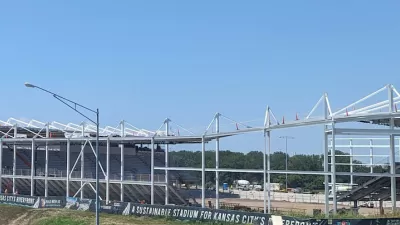In Kansas City, the historic home of jazz and Prohibition-era excess struggles with a redevelopment effort that attempts to build on that era's history while leaving behind some of its essential characteristics, writes Brandon R. Reynolds.
Fifteen years after its commencement, Reynolds discusses the incomplete redevelopment of the Historic 18th & Vine Jazz District into a newly thriving cultural mecca. While the area was once the heart of African-American life and culture in Kansas City, it's now an odd mix of cultural anchors and the simulacra of a bygone era.
Reynolds, in speaking with KC jazz ambassador David Basse, finds that what might be missing from efforts to resuscitate the area as a living, breathing center of culture once again are those elements that formed the foundation of its artistic flourishing: the late-night pleasures of gambling, drinking, and sex.
According to Reynolds, "Basse thinks that Chicago, Memphis, New Orleans, and New York draw people because they not only accept their wayward pasts, they celebrate them, and the things they produced. Kansas City, on the other hand, is more reticent to remind locals and tourists about that whole corruption/prostitution/gambling thing. 'All of that stuff is not something that is easy for a city or a convention and visitors' bureau or a Junior League to put out and say, ‘Come on out and experience this.'"
"Put another way: To not have the excess is to not have jazz. He quotes a musician friend: 'If you're not willing to stay up and party all night, you'll never have jazz in Kansas City, because that's what it's all about.'"
FULL STORY: The Jazz District Authenticity Problem

Alabama: Trump Terminates Settlements for Black Communities Harmed By Raw Sewage
Trump deemed the landmark civil rights agreement “illegal DEI and environmental justice policy.”

Planetizen Federal Action Tracker
A weekly monitor of how Trump’s orders and actions are impacting planners and planning in America.

The 120 Year Old Tiny Home Villages That Sheltered San Francisco’s Earthquake Refugees
More than a century ago, San Francisco mobilized to house thousands of residents displaced by the 1906 earthquake. Could their strategy offer a model for the present?

Ken Jennings Launches Transit Web Series
The Jeopardy champ wants you to ride public transit.

BLM To Rescind Public Lands Rule
The change will downgrade conservation, once again putting federal land at risk for mining and other extractive uses.

Indy Neighborhood Group Builds Temporary Multi-Use Path
Community members, aided in part by funding from the city, repurposed a vehicle lane to create a protected bike and pedestrian path for the summer season.
Urban Design for Planners 1: Software Tools
This six-course series explores essential urban design concepts using open source software and equips planners with the tools they need to participate fully in the urban design process.
Planning for Universal Design
Learn the tools for implementing Universal Design in planning regulations.
Clanton & Associates, Inc.
Jessamine County Fiscal Court
Institute for Housing and Urban Development Studies (IHS)
City of Grandview
Harvard GSD Executive Education
Toledo-Lucas County Plan Commissions
Salt Lake City
NYU Wagner Graduate School of Public Service





























